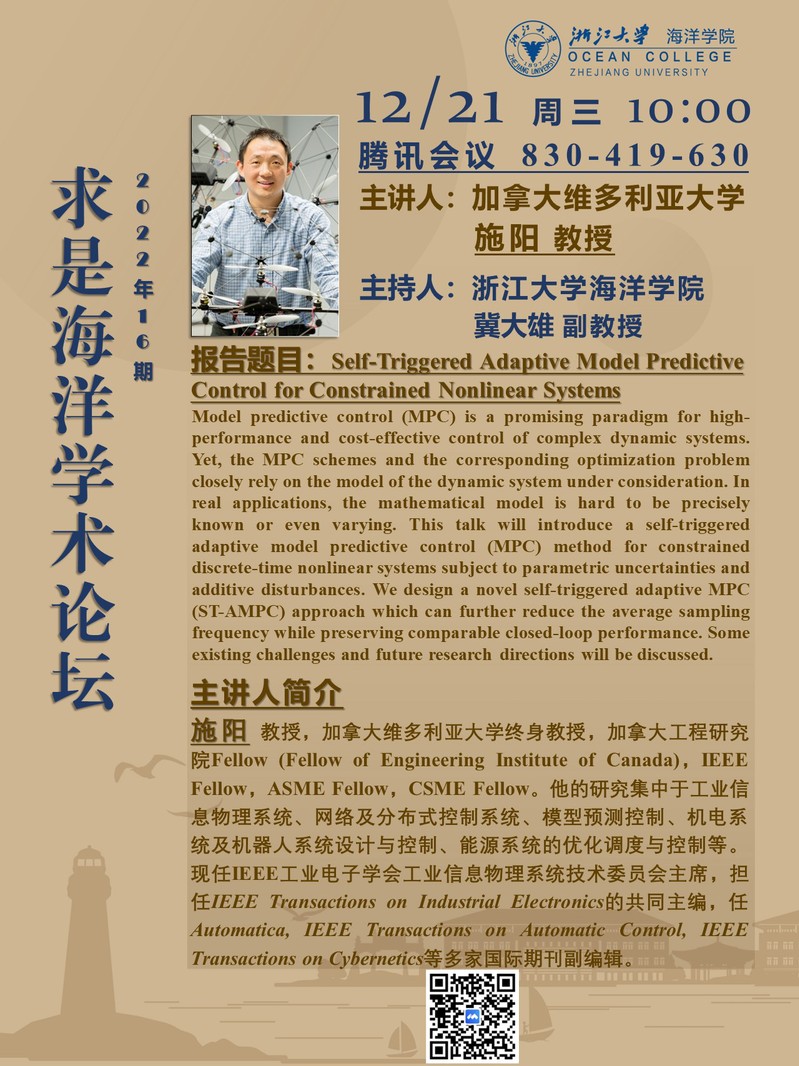求是海洋学术论坛2022年16期——Self-Triggered Adaptive Model Predictive Control for Constrained Nonlinear Systems

一、时间:2022年12月21日(周三)上午10:00
二、方式:腾讯会议830-419-630
三、主讲人:加拿大维多利亚大学 施阳教授
四、报告题目:Self-Triggered Adaptive Model Predictive Control for Constrained Nonlinear Systems (自适应模型预测控制)
报告摘要:
Model predictive control (MPC) is a promising paradigm for high-performance and cost-effective control of complex dynamic systems. Yet, the MPC schemes and the corresponding optimization problem closely rely on the model of the dynamic system under consideration. In real applications, the mathematical model is hard to be precisely known or even varying. This talk will introduce a self-triggered adaptive model predictive control (MPC) method for constrained discrete-time nonlinear systems subject to parametric uncertainties and additive disturbances. Firstly, a real-time zonotope-based set-membership parameter estimator is developed to refine a set-valued description of the time-varying parametric uncertainty based on the available measurements. We leverage this estimation scheme to design a novel self-triggered adaptive MPC (ST-AMPC) approach for uncertain nonlinear systems. Compared with the existing self-triggered robust MPC methods, the proposed ST-AMPC method can further reduce the average sampling frequency while preserving comparable closed-loop performance. Then, we theoretically show that, under some reasonable assumptions, the proposed ST-AMPC algorithm is recursively feasible, and the closed-loop system is input-to-state practical stable (ISpS) at triggering time instants. Finally, some existing challenges and future research directions will be discussed.
主讲人简介:
施阳教授,加拿大维多利亚大学终身教授,加拿大工程研究院Fellow (Fellow of Engineering Institute of Canada),IEEE Fellow,ASME Fellow,CSME Fellow。他的研究集中于工业信息物理系统、网络及分布式控制系统、模型预测控制、机电系统及机器人系统设计与控制、能源系统的优化调度与控制等。现任IEEE工业电子学会工业信息物理系统技术委员会主席,担任IEEE Transactions on Industrial Electronics的共同主编,任Automatica, IEEE Transactions on Automatic Control, IEEE Transactions on Cybernetics等多家国际期刊的副编辑。2007获得加拿大萨斯喀彻温大学十佳教学奖,2012年获得维多利亚大学工学院最佳教学奖,2015年获得维多利亚大学年度唯一的最佳研究银奖(Craigdarroch Silver Medal),2013年获得日本学术振兴会特邀访问教授奖,2017年获得德国洪堡研究基金;他与学生合著的论文获得2017年IEEE Transactions on Fuzzy Systems年度最佳论文奖。




